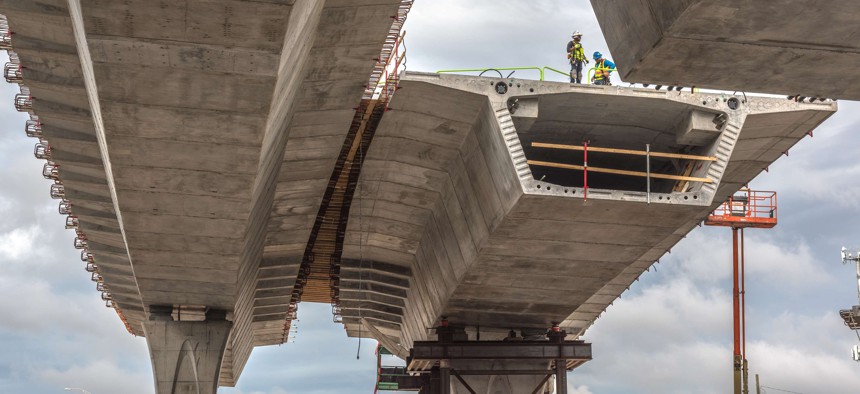GOP Senators Raise Infrastructure Counteroffer to $928B

Bridge construction in Miami, during 2020. iStock.com/CHUYN
Republicans and the White House are still far apart on the size of the package. And there are few signs of agreement on how to pay for it, with GOP lawmakers looking to repurpose Covid funding.
Senate Republicans on Thursday raised their infrastructure legislation counteroffer amid talks with the White House, proposing $928 billion of spending over eight years on programs for roads, water, transit, broadband and other areas.
Only about $257 billion of that total would be above expected baseline line spending levels and the largest share, $506 billion, would go to roads. The plan marks an increase from an earlier $568 billion plan that GOP lawmakers put forward, but is still well short of the latest version of President Biden's proposal, which is around $1.7 trillion.
Some of the other funding in the Republican blueprint includes $98 billion for transit, $72 billion for water programs, $65 billion for broadband and $46 billion for passenger and freight rail.
"It's a serious effort to try to reach a bipartisan agreement," said Sen. Shelley Moore Capito, of West Virginia, who has been the lead Republican negotiator with the White House on infrastructure.
In remarks to reporters before boarding Air Force One, Biden said he hadn't yet had a chance to review the details of the counteroffer. But he said he had "very brief, but a good" conversation with Capito.
"I told her we have to finish this really soon," the president said. "We're going to have to close this down soon."
White House press secretary Jen Psaki, in a statement, said it was "encouraging" to see the "substantially increased" funding level in the GOP plan and that there were "several constructive additions."
But Psaki said the administration remains concerned that the latest Republican offer "still provides no substantial new funds for critical job-creating needs, such as fixing our veterans’ hospitals, building modern rail systems, repairing our transit systems, removing dangerous lead pipes, and powering America’s leadership in a job-creating clean energy economy, among other things."
Significant Divides Remain
Apart from the differences on the amount of spending, there are significant divides between the two sides over how to pay for the legislation and the breadth of the package.
To pay for its plan, the Biden administration has proposed raising taxes on corporations—including upping the corporate tax rate to 28% from 21%. Republicans are opposed to the rate increase and any other tax policy changes that would roll back tax cuts that they ushered through Congress in 2017. Their proposal would involve redirecting money allocated under prior rounds of coronavirus relief.
"We're not raising taxes," said Sen. Pat Toomey, a Pennsylvania Republican.
Toomey said there are "many hundreds of billions" of dollars available under coronavirus relief laws approved over the past year or so that remain unspent and could be repurposed.
Ahead of the GOP plan's release, the White House pushed back on the notion that there's leftover relief funds.
"There are simply not hundreds of billions of dollars in Covid-relief funds available to repurpose," Deputy Press Secretary Karine Jean-Pierre said during a Wednesday press briefing.
Psaki added on Thursday: "We are worried that major cuts in Covid relief funds could imperil pending aid to small businesses, restaurants and rural hospitals using this money to get back on their feet."
Toomey said that if the money has been spent, the White House needs prove it. "We have not seen the numbers that suggest that," he said.
Democrats and the White House are advocating for a broader package that covers areas like vehicle electrification, combatting climate change and care for the elderly. Republicans favor a narrower approach, centered on steel and concrete public works.
"What we're proposing today could pass in a bipartisan way," said Sen. John Barrasso, a Wyoming Republican.
Democrats could turn to a legislative process known as reconciliation to pass parts of Biden's plan without Republican votes. The White House so far hasn't indicated that it is on the verge of giving up on negotiations and going that route. Although some Democrats have begun to signal that the situation could be moving that way.
Barrasso raised the prospect that the president's party might "override" him and pursue a package that is too sprawling to gain bipartisan support and that is "basically socialism camouflaged as infrastructure, which is the direction that they're heading."
Capito acknowledged there's still work to do to even arrive at a scope of the proposal that both parties can agree on.
"That is probably the big question," she said.
Biden is facing pressure from his party to not back down on certain aspects of his plan. For instance, over 200 House Democrats, more than 90% of the party's caucus in the chamber, sent a letter to House Speaker Nancy Pelosi this week calling for forthcoming infrastructure legislation to include strong labor standards.
Meanwhile, The Washington Post and other news outlets reported this week that a bipartisan group of Senators, including Utah Republican Mitt Romney, and centrist Democrat Joe Manchin, of West Virginia, are in the early stages of working on an alternative infrastructure proposal, which could come into play if the current negotiations falter.
Psaki said in her statement that the White House is "continuing to explore other proposals that we hope will emerge."
"We will work actively with members of the House and Senate next week, so that there is a clear direction on how to advance much needed jobs legislation when Congress resumes legislative business during the week of June 7," she added.
Bill Lucia is a senior editor for Route Fifty and is based in Olympia, Washington.
NEXT STORY: An Overlooked Economic Powerhouse for Small Cities






